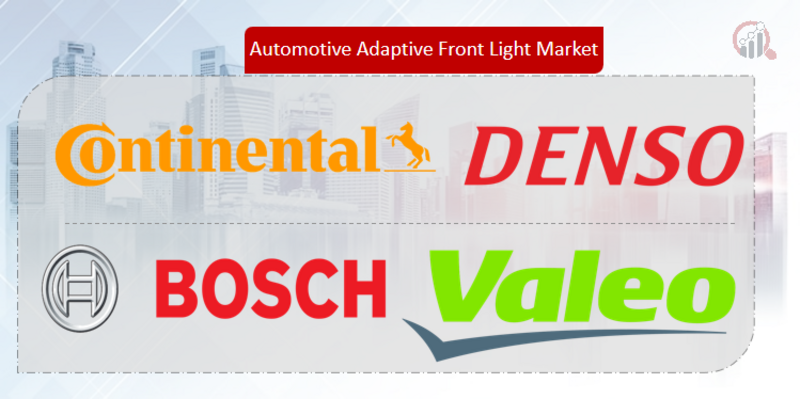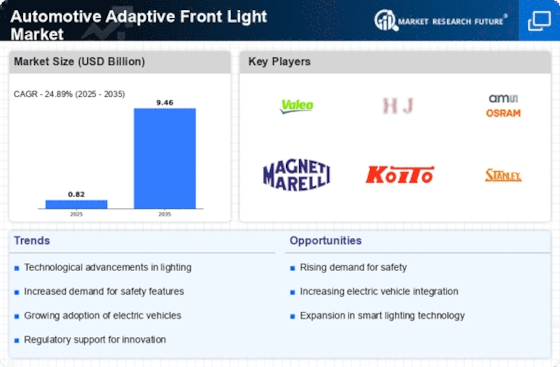Top Industry Leaders in the Automotive Adaptive Front Light Market

Illuminating the Road: Exploring the Competitive Landscape of the Automotive Adaptive Front Light Market In the vibrant tapestry of automotive technology, where safety and style intertwine, the adaptive front light market shines bright. This multi-billion dollar space hums with activity, a battlefield where established giants, nimble innovators, and regional champions vie for a share in illuminating the road ahead with precision and dynamism. Let's navigate the key strategies, market dynamics, and future trends shaping this dynamic landscape.
Key Player Strategies:
Global Titans: Companies like Valeo, Hella, and Bosch leverage their extensive experience, diverse product portfolios, and global reach to maintain their dominance. They cater to major automakers, offering advanced adaptive front light systems (AFS) encompassing high-intensity LEDs, precise beam control modules, and integration with driver assistance systems. Valeo's Blade AFS exemplifies their focus on sleek and modular headlight designs with advanced light control.
Technology Disruptors: Startups like Lumileds and Osram Continental Automotive are disrupting the market with novel technologies like micro-LED arrays for granular beam manipulation, laser headlights for extended illumination range, and AI-powered light prediction algorithms. They cater to tech-savvy customers seeking cutting-edge performance and personalized lighting experiences. Lumileds' LUXEON Matrix LEDs showcase their focus on high-resolution LED arrays for precise light shaping.
Cost-Effective Challengers: Chinese manufacturers like Geely and Chery are making waves with competitively priced AFS, targeting budget-conscious carmakers in emerging markets. They focus on basic functionality and affordability, offering alternatives to premium brands. Geely's AFS systems on their newer models demonstrate their focus on cost-competitive entry into the market.
Niche Specialists: Companies like Magneti Marelli and Koito excel in specific AFS segments, like motorcycle headlights or off-road lighting systems. They leverage deep understanding of specialized requirements and strong relationships with niche vehicle manufacturers. Koito's LED headlights for motorcycles showcase their focus on tailored lighting solutions for specific vehicle types.
Factors for Market Share Analysis:
Technology Innovation: Investing in R&D for next-generation AFS technologies like adaptive high beams, dynamic cornering lights, and pedestrian detection-based illumination is crucial for staying ahead of the curve. Companies leading in innovation attract premium contracts and early adopters.
Safety and Visibility: Ensuring precise beam control, minimizing glare for oncoming drivers, and optimizing visibility in diverse weather conditions are paramount for driver safety. Companies with strong track records in safety-enhancing AFS features gain market share.
Regulatory Compliance: Adhering to stringent regulations for headlight performance, light distribution, and electromagnetic compatibility is crucial for market access and regulatory approvals. Companies demonstrating regulatory compliance gain an edge.
Cost and Affordability: Balancing advanced features with competitive pricing is vital for mass adoption, particularly in cost-sensitive markets. Companies offering affordable AFS without compromising performance or safety stand out.
New and Emerging Trends:
Focus on Personalized Lighting: Implementing user-configurable light profiles, adapting beam patterns to individual driving styles, and integrating with personalized infotainment systems enhances driver comfort and creates a unique driving experience. Companies embracing personalized lighting cater to this growing trend.
Increased Reliance on Sensors and Cameras: Integrating AFS with advanced driver assistance systems (ADAS) sensors like cameras and radar allows for real-time adjustments based on road conditions, obstacles, and pedestrian detection. Companies embracing integrated ADAS functionality attract buyers seeking comprehensive safety solutions.
Connectivity and Data Analytics: Implementing cloud-based data analysis platforms for AFS performance monitoring, remote diagnostics, and over-the-air software updates enables improved user experience and preventative maintenance. Companies offering connected AFS cater to the increasing demand for vehicle data and remote management.
Focus on Sustainability: Utilizing energy-efficient LED technology, reducing production waste, and developing recyclable components aligns with sustainability goals. Companies promoting environmentally conscious practices attract responsible investors and potential regulatory benefits.
Overall Competitive Scenario:
The automotive adaptive front light market is a dynamic and exciting space with diverse players employing varied strategies. Established giants leverage their reach and diverse portfolios, while technology disruptors introduce innovative solutions. Cost-effective challengers cater to budget-conscious buyers, and niche specialists excel in specific segments. Factors like technology innovation, safety, affordability, and regulations play a crucial role in market share analysis. New trends like personalized lighting, ADAS integration, connectivity, and sustainability offer exciting growth opportunities. To succeed in this evolving market, players must prioritize innovation, cater to diverse driver needs, embrace safety features, explore data-driven solutions, and implement sustainable practices. By illuminating the road ahead with intelligent, personalized, and eco-conscious headlight technology, they can secure a dominant position in this ever-changing landscape.
Industry Developments and Latest Updates:
Continental AG:
Nov 9, 2023: High-precision oxygen sensor improves durability for harsh environments, potentially influencing headlight adaptation based on emissions data for optimal visibility.
Dec 6, 2023: Wins major contract to supply exhaust gas sensor systems for hybrid vehicles, potentially impacting headlight adaptation based on emissions.
De Amertek Corporation:
Oct 24, 2023: Showcases low-cost adaptive headlight module targeting budget-conscious car manufacturers.
Dec 12, 2023: Partners with Chinese lighting company to develop advanced LED drivers for improved efficiency and performance in adaptive headlights.
Denso Corporation:
Oct 20, 2023: Develops self-cleaning exhaust gas sensor system, potentially influencing headlight adaptation based on emissions data.
Dec 29, 2023: Collaborates with Korean fuel cell company to develop advanced exhaust sensors for hydrogen vehicles, impacting headlight adaptation in future fuel cell technology.
Top Companies in the Automotive Adaptive Front Light industry includes,
Continental AG
De Amertek Corporation
Denso Corporation
HELLA GmbH & Co. KGaA
Hyundai Mobis Co., Ltd.
Johnson Electric Holdings Ltd.
Koito Manufacturing Co., Ltd.
Magneti Marelli SpA
NEOLITE ZKW
Robert Bosch GmbH
Stanley Electric Co., Ltd.
Texas Instruments, Inc.
Valeo SA










